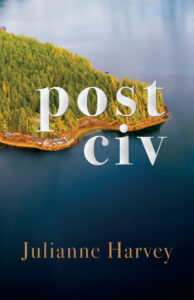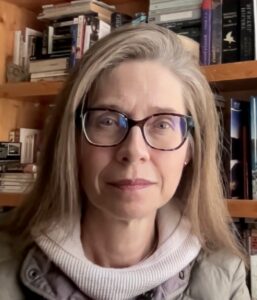A new just world
Post Civ
by Julianne Harvey
Surrey: Ruby Finch Books, 2024
$25.00 / 9780987797841
Reviewed by Dana McFarland
*

In my long ago grade 12 “Western Civilization” elective class, the curriculum was based on a BBC history series titled simply Civilisation, which offered an overview of the arc of Western progress. Reading Surrey resident Julianne Harvey’s novel Post Civ suggests a question that I don’t recall being addressed in that high school course: What happens when the building wave of civilization overtakes itself, sweeping its own foundations out from under, together with everything alongside? As the book jacket challenges, “could we build a better, fairer world if we were forced to start over?”
For Harvey (Jamesy Harper’s Big Break), a re-do begins not in a nuclear desert or ruined city, but on an island. Philip Pullman has described plotting a story as selecting among “elementary particles of narrative,” each of which may be uniquely charged with meaning, or choosing a way through the woods, where story illuminates a path, suggesting patterns and meaning among otherwise disconnected events. In this way many imaginative works—from the venerable (Robinson Crusoe, Swiss Family Robinson, The Coral Island, Lord of the Flies) to more recent films and series (Cast Away, Lost, and Class of 2007)—have followed characters stranded on an island, charting a course among events and consequences to see what may happen when humans must rise to a critical situation.
In Post Civ, readers encounter a small group of people who drift together gradually on a west coast island. Their story embarks in a different direction than other castaway tales, as they actively reject the dystopic recent past. Struggling to build their new “town,” each one perceives, accepts, and persists with the challenge to be better and fairer, in spite of past and ongoing traumas, the demanding circumstances of survival, and diverse backgrounds and perspectives that effectively wear at their commitment.
The author anticipates that some readers may find fault with the novel, for she assumes voices and positionalities that are not hers, in order to assemble the diverse perspectives that comprise the narrative. Others who are concerned with logistics of disaster and survival or landscape and navigation may also have questions about details of setting and action. I think it would be reasonable to weigh any criticisms against the author’s stated purpose.
Responding to recent world events and how far humanity is from “creating an equal and fair society,” Harvey set out as a novelist in Post Civ to “destroy it all … and start over with a handful of survivors, to see if they could build something better.” This intention pairs with the mission of Harvey’s publishing company, Ruby Finch Books, “to bring honest, vulnerable, and inspiring books and experiences to readers, writers, teachers, and librarians by prioritising mental health and wellness,” and inclines the novel to a tone that sometimes feels therapeutic, but also comfortingly consistent in seeking “something better” even when the subject matter is difficult.

That Post Civ navigates fraught themes of a dystopic near future in this careful and intentional manner makes its niche and genre a little puzzling to consider. The values of care foregrounded by the author / author-as-publisher are reflected in the inclusion of content warnings in the front matter—a first for me to see such warnings included within a novel itself. An affirming tone and a quality of gentleness in approach suggest features in common with the category of “clean reading”; even so, the novel addresses diversity, gender, social justice, violence, and difficult events with directness not typically found in clean reads. Thematic elements of the novel place it among works of climate fiction and hope punk; but while Post Civ passes through bleakness, it resists dwelling in bleakness, and this sets the novel apart:
It was painful to think about how far they had come, from the shocked early days when no one trusted anyone else, to those endless discussions about fairness, and privilege, and what had destroyed the old world not being allowed to continue here on this island, only to end up here, a group split by age and ideals…
“Why don’t you come over here and see what I’m seeing? Why don’t you all come? … I feel embarrassed that I said no to them. It would be like turning away any of you….”
Probably a fitting alignment for Post Civ is with other works of “visionary fiction,” a term developed by Octavia’s Brood co-editor Walidah Imarisha to describe “fantastical writing that helps us imagine new just worlds. Visionary fiction encompasses science fiction, fantasy, horror, magical realism, alternative timelines, and more. It is fantastical literature that helps us to understand existing power dynamics, and helps us imagine paths to creating more just futures.”
In supporting such imagining, Harvey does not provide the reader with a finished vision, but rather with a narrative that illustrates how choices can be made and negotiations take place among individuals and groups who are authentically committed to doing better. Finally, the Post Civ group is met by a challenge that will test what they are building together. Readers also may be compelled to consider: what could this mean for their next actions to create a better, fairer world?
[Editor’s note: White Rock Library will host Julianna Harvey for the launch of Post Civ, Saturday, September 14, starting at 2pm. See author’s website for additional events.]
*

Dana McFarland is a librarian at Vancouver Island University Library. She also works with the Community Scholars Program based at SFU, which connects eligible unaffiliated scholars in BC with academic library resources and services. She has worked with Royal Roads University, UBC, the Hul’qumi’num Treaty Group, and other library collaborative organizations. She lives in stz’uminus territory and keeps bees, when they agree to stay. [Editor’s note: Dana McFarland previously reviewed Rebecca Campbell and Susan Juby in BCR.]
*
The British Columbia Review
Interim Editors, 2023-25: Trevor Marc Hughes (non-fiction), Brett Josef Grubisic (fiction and poetry)
Publisher: Richard Mackie
Formerly The Ormsby Review, The British Columbia Review is an online book review and journal service for BC writers and readers. The Advisory Board now consists of Jean Barman, Wade Davis, Robin Fisher, Barry Gough, Hugh Johnston, Kathy Mezei, Patricia Roy, Maria Tippett, and Graeme Wynn. Provincial Government Patron (since September 2018): Creative BC. Honorary Patron: Yosef Wosk. Scholarly Patron: SFU Graduate Liberal Studies. The British Columbia Review was founded in 2016 by Richard Mackie and Alan Twigg.
“Only connect.” – E.M. Forster
One comment on “A new just world”
What a thoughtful review. You described ideas that were new to me and I am intrigued. Thank you.